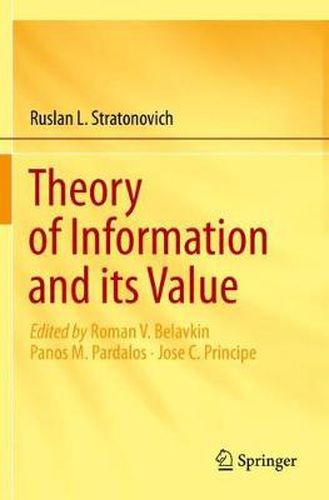Readings Newsletter
Become a Readings Member to make your shopping experience even easier.
Sign in or sign up for free!
You’re not far away from qualifying for FREE standard shipping within Australia
You’ve qualified for FREE standard shipping within Australia
The cart is loading…






This title is printed to order. This book may have been self-published. If so, we cannot guarantee the quality of the content. In the main most books will have gone through the editing process however some may not. We therefore suggest that you be aware of this before ordering this book. If in doubt check either the author or publisher’s details as we are unable to accept any returns unless they are faulty. Please contact us if you have any questions.
This English version of Ruslan L. Stratonovich’s Theory of Information (1975) builds on theory and provides methods, techniques, and concepts toward utilizing critical applications. Unifying theories of information, optimization, and statistical physics, the value of information theory has gained recognition in data science, machine learning, and artificial intelligence. With the emergence of a data-driven economy, progress in machine learning, artificial intelligence algorithms, and increased computational resources, the need for comprehending information is essential. This book is even more relevant today than when it was first published in 1975. It extends the classic work of R.L. Stratonovich, one of the original developers of the symmetrized version of stochastic calculus and filtering theory, to name just two topics.
Each chapter begins with basic, fundamental ideas, supported by clear examples; the material then advances to great detail and depth. The reader is not required to be familiar with the more difficult and specific material. Rather, the treasure trove of examples of stochastic processes and problems makes this book accessible to a wide readership of researchers, postgraduates, and undergraduate students in mathematics, engineering, physics and computer science who are specializing in information theory, data analysis, or machine learning.
$9.00 standard shipping within Australia
FREE standard shipping within Australia for orders over $100.00
Express & International shipping calculated at checkout
This title is printed to order. This book may have been self-published. If so, we cannot guarantee the quality of the content. In the main most books will have gone through the editing process however some may not. We therefore suggest that you be aware of this before ordering this book. If in doubt check either the author or publisher’s details as we are unable to accept any returns unless they are faulty. Please contact us if you have any questions.
This English version of Ruslan L. Stratonovich’s Theory of Information (1975) builds on theory and provides methods, techniques, and concepts toward utilizing critical applications. Unifying theories of information, optimization, and statistical physics, the value of information theory has gained recognition in data science, machine learning, and artificial intelligence. With the emergence of a data-driven economy, progress in machine learning, artificial intelligence algorithms, and increased computational resources, the need for comprehending information is essential. This book is even more relevant today than when it was first published in 1975. It extends the classic work of R.L. Stratonovich, one of the original developers of the symmetrized version of stochastic calculus and filtering theory, to name just two topics.
Each chapter begins with basic, fundamental ideas, supported by clear examples; the material then advances to great detail and depth. The reader is not required to be familiar with the more difficult and specific material. Rather, the treasure trove of examples of stochastic processes and problems makes this book accessible to a wide readership of researchers, postgraduates, and undergraduate students in mathematics, engineering, physics and computer science who are specializing in information theory, data analysis, or machine learning.